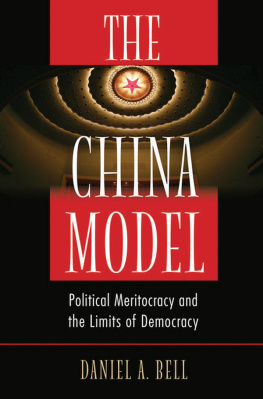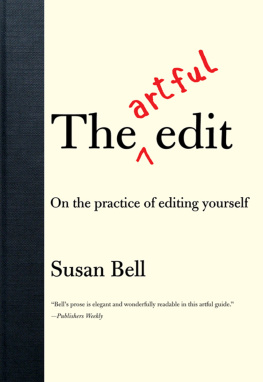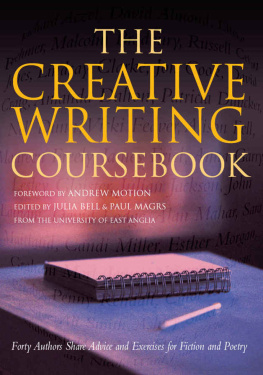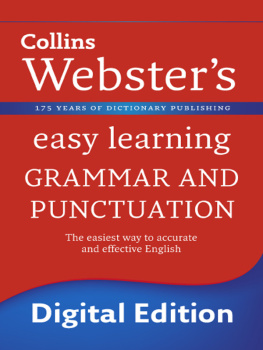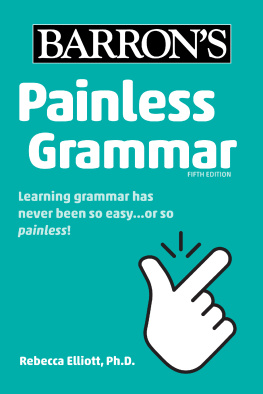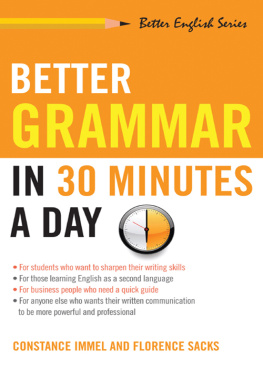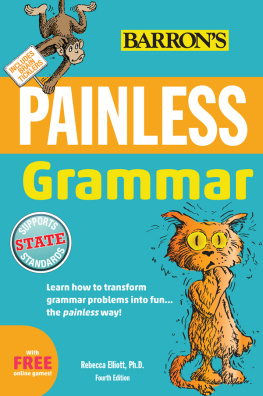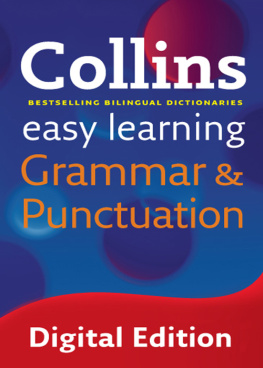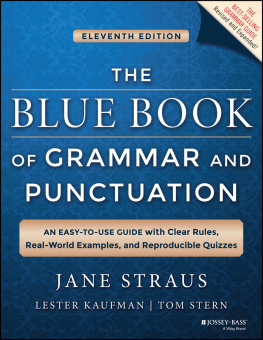Clean, Well-Lighted Sentences
A Guide to Avoiding the Most Common Errors in Grammar and Punctuation
Janis Bell
W. W. Norton & Company
NEW YORK LONDON
Copyright 2008 by Janis Bell
All rights reserved
For information about permission to reproduce selections from this book, write to Permissions, W. W. Norton & Company, Inc.,
500 Fifth Avenue, New York, NY 10110
Library of Congress Cataloging-in-Publication Data
Bell, Janis.
Clean, well-lighted sentences: a guide to avoiding the most common errors in grammar and punctuation / Janis Bell.1st ed.
p. cm.
ISBN: 978-0-393-07547-2
1. English languageSentencesProblems, exercises, etc.
2. English languageGrammarProblems, exercises, etc.
3. English languageErrors in usage. 4. English languageRhetoric.
I. Title.
PE1441.B43 2008
428.2dc22
2008021345
W. W. Norton & Company, Inc.
500 Fifth Avenue, New York, N.Y. 10110
www.wwnorton.com
W. W. Norton & Company Ltd.
Castle House, 75/76 Wells Street, London W1T 3QT
To all the modifiers in my life who
positioned themselves right next to me
and never budged. Im grateful for the
loyalty and definition.
Contents
Preface
Another grammar book? Why?
Youve seen grammar books beforeyou may even own one that you pull out now and again, when youre uncertain about a sentence you wrote. Chances are, however, that you close that book pretty soon after you open it because you dont find the answer to your question. In fact, you cant figure out even how to look for the answer to your question because the text is comprehensive and filled with terms youve long forgotten.
English is your native tongue. Or its not, but you know it well enough to be dreaming in it. You dont need a book that teaches grammar from the ground up. All you need is a guide that answers the questions you have from time to time, an explanation of the problems that typically crop up when youre writing sentences. Some relate to grammar ( Is it who or whom , will or would , its or its ? ); some relate to usage ( Is it lie or lay , affect or effect , everyday or every day ?); some relate to punctuation ( What belongs herea comma or semicolon? Dash or hyphen? Single quotes or double? ). Whatever the question, this book answers it in a way that will make sense to you.
How can I make that claim when I dont know you and Ive never seen your sentences? Unless youre very different from the thousands of people Ive taught over the last three decades in both academic and business classrooms, I do know you and I have seen your sentences. I know where your grammar and usage errors hang out. I know where your punctuation gaffes live. I can tell you exactly what these characters look like and the fragrances they wear. After reading this text, youll be able to spot a mistake from around the corner. You may even be able to smell it.
Of necessity, this book contains grammar terminology, but it defines all terms in an introductory section and defines them again when they appear in a chapter. It discusses each issue, rather than just listing rules. It presents many sample sentences, incorrect and correct, so that you can see the concepts in action. It asksand answersthe questions youre likely to have. It gives you a quiz to take at the end of each chapter, as well as answers to the quizzes, so that you can see what youve learned and what you still need to work on. It turns on the floodlights and even makes you laugh.
Finally, this book increases your confidence, which is key to writing well. I wish I could just sprinkle some self-assurance on your cereal in the morning and watch your sentences transform by the afternoon. But, alas, theres no such product on the market. We all have to make it from scratch by strengthening our skills. Thats what youll be doing as you work your way through this text.
Once you can produce clean, well-lighted sentences, youll approach every writing project with a can-do attitude. Im not promising that youll ever like to write (few people do); Im saying that youll be able to write in a way that commands respectfrom you and from your readers.
Cmon now, turn the page, scan the terminology, and jump into a chapter, any chapter. When you encounter one of your own sentences there, youll wonder how many others slipped into this book when you werent looking. Its time to keep an eye on them, dont you think?
Janis Bell
Grammar Terminology
Parts of Speech
noun | a word that names a person, place, or thing. Nouns can be concrete ( Josephine , Alabama , spinach ) or abstract ( fear , integrity , attitude ). |
pronoun | a word ( she , he , it , they , who , that , which , myself ) that stands in for/refers to a noun |
verb or verb package | a word ( eat , ate ) or group of words ( has eaten , had eaten ) that depicts the action associated with a subject |
modifier | a general term for any descriptive word or group of words (adjectives and adverbs) |
adjective | a word ( delicious ) or group of words ( which is delicious ) that describes a noun or pronoun |
adverb | a word ( quickly ) or group of words ( in two minutes ) that describes a verb ( eat ) in terms of how, when, where, or why |
preposition | a word that often conveys direction or position ( in , on , to , from , under , over , between , among ), but not always ( by , for , of ). Prepositions combine with a noun, pronoun, or noun equivalent to form a phrase ( by the way , to him , in writing ). |
gerund | an action word ending in ing that functions as a noun ( eating is my favorite pastime ; I enjoy eating ). Gerunds are noun equivalents. |
infinitive | the source from which all verbs come, beginning with to and ending with an action word ( to eat , to relax , to converse ). Even though infinitives look like verbs, they dont function as verbs. They do other jobs: they can serve as nouns ( to nibble is enjoyable ; to scarf up is divine ), in which case they are noun equivalents; or they can serve as adjectives ( to finish this meal, one must have a large appetite ), in which case they are part of a phrase that describes a noun or pronoun. |
participle | an action word ending in ing ( debating ) or ed ( digested ) or an irregular form ( forgotten ). On their own, participles do not function as verbs. They can be part of a verb package, when preceded by an actual verb ( am eating , was digested , had been forgotten ). Or they can be adjectives, when placed next to a noun ( debating team , digested food , forgotten plan ). |
Sentence Roles
subject | a noun, pronoun, or noun equivalent representing a person, place, or thing connected to a verb (an action). Usually, a subject is located to the left of a verb: |
Josephine receives a lot of mail. |
She is admired by her friends. |
Talking on the phone is her favorite pastime. |
Occasionally, a subject follows a verb (in sentences that begin with prepositional phrases, for example): |
On the line is Josephine . |
At the center of the debate is Josephine . |
Always, however, the subject is the answer to the question who or what? before the verb. For instance, when you ask Who or what receives a lot of mail? (in the first sample sentence), the answer is Josephine ; when you ask Who or what is her favorite pastime?(in the third sample sentence), the answer is talking ; when you ask Who or what is at the center of the debate?(in the final sample sentence), the answer is Josephine . |



